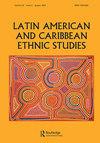Defending Ñöñhö identity and survival through festival performances and the affirmation of local cultural sovereignty in Querétaro, Mexico
IF 1
Q4 ETHNIC STUDIES
引用次数: 0
Abstract
ABSTRACT The festivals of San Miguel in the municipality of Tolimán, performed by the Ñöñhö (Otomí) indigenous community of the Querétaro Mexican state, include different celebrations. This article focuses on two such celebrations: the Danza de Conquista and the ritual of the chimal. I approach these two celebrations as elements of Ñöñhö identity making and as illustrations of the resilience of the people of Tolimán who rejected the proposal to have the festivals recognized as Intangible Cultural Heritage of Humanity by UNESCO. In June and July of 2021, I interviewed participants in the festivals and representatives of cultural institutions that promote them. My fieldwork was guided by a series of key questions: (a) What are the meanings of the chimal for Tolimanenses? (b) How do Tolimanenses see emigration to the United States, and in what ways do people who emigrate there maintain links with these festive traditions? (c) what were the steps of the process that led to the proposal to have UNESCO designate the festivals as Intangible Cultural Heritage? My research reveals the festivals as having a transformative power of resilience, belonging, and identity validation.通过节日表演捍卫Ñöñhö的身份和生存,以及对墨西哥奎尔梅塔罗地方文化主权的肯定
墨西哥quersamutaro州的Ñöñhö (Otomí)土著社区举办了Tolimán市的圣米格尔节日,包括各种庆祝活动。本文主要介绍两种这样的庆祝活动:“征服之舞”(Danza de Conquista)和“chimal”仪式。我认为这两个庆祝活动是Ñöñhö身份塑造的元素,也是Tolimán人民的韧性的例证,他们拒绝了将这两个节日列入联合国教科文组织人类非物质文化遗产的提议。在2021年6月和7月,我采访了艺术节的参与者和文化推广机构的代表。我的实地工作是由一系列关键问题指导的:(a)对Tolimanenses来说,chimal的意义是什么?(b) Tolimanenses如何看待移民到美国,移民到那里的人如何与这些节日传统保持联系?(三)建议联合国教科文组织指定这些节日为非物质文化遗产的过程有哪些步骤?我的研究表明,节日具有一种具有复原力、归属感和身份验证的变革力量。
本文章由计算机程序翻译,如有差异,请以英文原文为准。
求助全文
约1分钟内获得全文
求助全文
来源期刊

Latin American and Caribbean Ethnic Studies
Social Sciences-Cultural Studies
CiteScore
1.30
自引率
16.70%
发文量
22
 求助内容:
求助内容: 应助结果提醒方式:
应助结果提醒方式:


